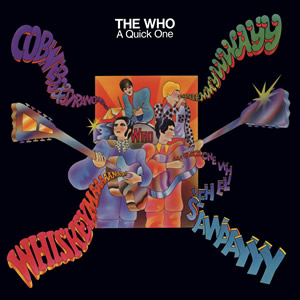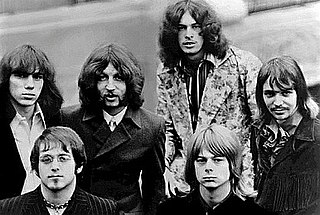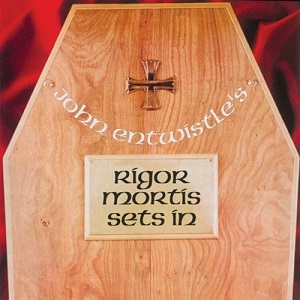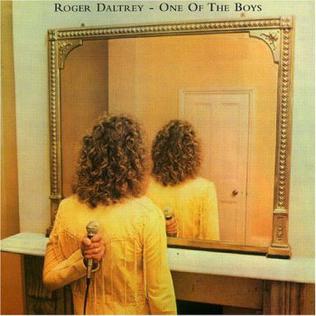
John Alec Entwistle was an English musician who was the bassist for the rock band the Who. Entwistle's music career spanned over four decades. Nicknamed "The Ox" and "Thunderfingers", he was the band's only member with formal musical training and also provided backing and occasional lead vocals. Entwistle was inducted into the Rock and Roll Hall of Fame as a member of the Who in 1990.

A Quick One is the second studio album by the English rock band the Who, released on 9 December 1966. A version of the album with an altered track listing was released under the name Happy Jack on Decca Records in April 1967 in the United States, where the song "Happy Jack" was a top 40 hit.

The Amboy Dukes were an American rock band formed in 1964 in Chicago, Illinois, and later based in Detroit, Michigan. They are best known for their only hit single, "Journey to the Center of the Mind". The band's name comes from the title of a novel by Irving Shulman. In the UK, the group's records were released under the name of the American Amboy Dukes, because of the existence of a British group with the same name. The band went through a number of personnel changes during its active years, the only constant being lead guitarist and composer Ted Nugent. The band transitioned to being Nugent's backing band before he discontinued the name in 1975.

Manfred Mann's Earth Band are an English rock band formed by South African musician Manfred Mann. Their hits include covers of Bruce Springsteen's "For You", "Blinded by the Light" and "Spirit in the Night". After forming in 1971 and with a short hiatus in the late 1980s/early 1990s, the Earth Band continues to perform and tour.

Steve Gibbons is an English singer-songwriter, guitarist and bandleader. His music career spans more than 50 years.

Who Are You is the eighth studio album by the English rock band the Who, released on 21 August 1978 by Polydor Records in the United Kingdom and MCA Records in the United States. Although the album received mixed reviews from critics, it was a commercial success, peaking at number 2 on the US charts and number 6 on the UK charts.

Smash Your Head Against the Wall is the debut solo studio album by English rock musician John Entwistle, released in May 1971 by Track Records in the UK and Decca Records in the US. Smash Your Head Against the Wall was the first solo album by any member of rock band the Who, born out of Entwistle's frustrations within the band, namely not having as many of his songs featured on their albums as he would've liked, and it features a guest appearance by the Who's drummer Keith Moon on one track, as well as strong musical influences from the band's work.

The Madness is the only studio album by the British ska/pop band The Madness, a short-lived incarnation of Madness. It was originally released in mid-1988, on the label Virgin. The album was produced by the Three Eyes, a pseudonym, whose identities remain a mystery. With the demise of Madness and the group's own label Zarjazz, the Madness were directly recruited under Virgin Records.

Whistle Rymes is the second solo studio album by English rock musician John Entwistle, released on 3 November 1972 by Track Records in the UK and on 4 November 1972 by Decca Records in the US. Entwistle co-produced the album with John Alcock, his first work with a producer after self-producing his debut studio album, Smash Your Head Against the Wall (1971), and it was recorded at Island Studios in West London's Notting Hill district. The album features guitar contributions from both Peter Frampton and Jimmy McCulloch.

Rigor Mortis Sets In is the third solo studio album by the English rock musician John Entwistle, who was the bassist for the Who at that time. Distributed by Track Records, the album was named John Entwistle's Rigor Mortis Sets In in the US. Co-produced by Entwistle and John Alcock, it consists of two 1950s rock and roll covers, one 1960s cover, a new version of the Entwistle song "My Wife" from the Who's fifth studio album Who's Next (1971), and new tracks. Rigor Mortis Sets In set in motion Entwistle assembling his own touring unit during the increasing periods of the Who's inactivity.

Mad Dog is the fourth solo studio album by the English rock musician John Entwistle, who was the bassist for the Who at that time. It was his last solo studio album for six years, and the debut album by his band John Entwistle's Ox.
John Weider is an English rock musician who plays guitar, bass, and violin. He is best known as the guitarist for the Animals from 1966 to 1968. He was also the bass player for Family from 1969 to 1971.

The Rock is the only studio album by English rock band The Rock, credited to founding bassist John Entwistle of the Who, issued by Griffin Music.

Music from Van-Pires is the only studio album recorded by the John Entwistle Band and is Entwistle's final studio album before his death in 2002. It was a soundtrack for the Sci-Fi Award-winning UPN animated children's computer-generated television series Van-Pires, which only aired between 1997 and 1998, shooting 13 episodes, which Entwistle had been involved with. Some of the tracks appear on his solo compilation album So Who's the Bass Player? The Ox Anthology (2005), despite this. The album was not re-released alongside Entwistle's other solo studio albums in 2005.
The Fabulous Poodles were a British pre-new wave band formed in 1975. Known for quirky stage antics, such as exploding ukuleles, as well as songs with funny lyrics, The Fabulous Poodles toured with Meat Loaf, Sha Na Na, Tom Petty, Bill Bruford and Chuck Berry. They appeared on the Old Grey Whistle Test and for a long time were music critic John Peel's favourite group. The band released three albums between 1977 and 1979 on Pye Records.

One of the Boys is the third studio solo album by the Who's lead vocalist, Roger Daltrey. It was released in 1977, on Polydor in the UK, and MCA in the US. The sessions were recorded at the Who's Ramport Studios during the winter of 1976, and Daltrey allowed students from the local Battersea technical school to film them as an educational project. This also marked the first time that Daltrey had written or co-written a song since "Here for More" in 1970, and Lisztomania in 1975. Daltrey's original choice for producers were Jerry Leiber and Mike Stoller, but they declined.

Live at Hull 1970 is a live album by the English rock band The Who. Their performance at Hull City Hall on 15 February 1970 was recorded with the Pye Mobile Unit by Bob Pridden. In a few songs the bass guitar sound was either badly recorded or lost due to technical problems. For these songs, the bass guitar track from the previous night's Live at Leeds performance was matched to the Hull performance, allowing the show to be presented in full.

King Biscuit Flower Hour Presents in Concert is a live solo album by John Entwistle, who was the bassist for English rock band the Who. The album was recorded live for broadcast on the King Biscuit Flower Hour at the Spectrum in Philadelphia in March 1975, during a tour of North America, opening for Humble Pie.

Down in the Bunker is the third studio album by the Steve Gibbons Band. The album was produced by Tony Visconti. The reissue tracks were produced by Bobby Priden, who is best known for working with The Who.

The Genesis of Slade is a compilation album of pre-Slade era recordings by British rock band Slade. It was first released in 1996 by The Music Corporation and was later re-issued by Cherry Red in 2000.

















